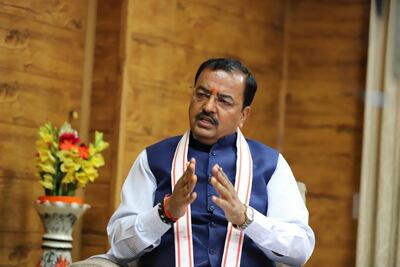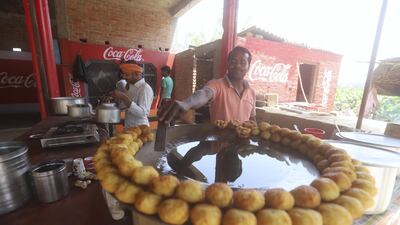From his window in a new apartment block in Lucknow, a former Dubai resident sees names he instantly recognises, from the massive Emaar residential project being built across the road to a Lulu supermarket that will open further up.
These are concrete symbols of development in the north Indian city he left about 20 years ago to work in the UAE.
They are also the reasons Jaideep Pai will vote for Prime Minister Narendra Modi’s Bharatiya Janata Party in the ongoing general election.
“When I look outside and see the new construction, it’s as if Dubai has followed us home. New roads have been built, new malls and high-rise apartments,” said Mr Pai, who worked with a UAE telecoms firm and returned to India to start an event management company with his wife.
“There is a lot of infrastructure development taking place. The economy is growing and there is a boom in many sectors. I feel the BJP will come back because overall they have done some good work. He [Modi] has brought results and you can see the change.”

India is among the world’s fastest-growing economies, with foreign direct investment touching a record $40 billion (Dh147bn) last year.
The country is also set to unseat the UK as the fifth-largest trillion-dollar economy, according to projections by the International Monetary Fund.
However, there have been drawbacks. A federal policy termed "demonetisation" — intended to flush out undeclared wealth, also known as black money — continues to affect the growth of small businesses more than three years after it was implemented.
The government has also come in for severe criticism for the spate of attacks on Muslims and members of lower castes for allegedly eating beef or slaughtering cows, an animal that is sacred to many Hindus.
Critics have also come down heavily on the aggressive brand of Hindu nationalism that picked up after the BJP took charge in 2014.
But many Indians said this would not stop them for voting for Mr Modi.
“Yes, he needs to rein in some factors but overall he has been doing well. India is a very big and diverse country. For such a country, the leadership has to be very strong to achieve anything,” Mr Pai said.
“The moment you have too much consultation or consensus, we get bogged down, everything slows down and we lose speed that is one of the most important aspects for a growing economy. A strong leadership has to be the starting point. There will always be detractors but people who are with him will continue to be with him.”
Voters who helped the BJP sweep to power with an outright majority five years ago recall the corruption scandals under the previous coalition government led by the Congress party, when bribes were allegedly paid for contracts ranging from Commonwealth Games projects to telecom licences.
They back Mr Modi’s reforms, from a nationwide goods and services tax that will make it tough to circumvent levies to a law enforcing transparency in a real estate sector known for cash transactions on which taxes are not paid.
“I’m tired of people thinking that I’m a Modi bhakht [devotee] or a Hindu nationalist because I support the BJP,” said Vaishali Bajpai, a garment exporter.
“I back the party because corruption even at lower levels has come down. Before we had to pay to get licences and papers passed but government officials now are too scared of being hauled up in the new regime. It’s easier and cleaner doing business and I hope that will continue.”
Opinion polls have forecast victory for the BJP and its allies with a reduced majority, but the government remains confident it will easily beat an opposition alliance of 20 parties including the Congress.

Keshav Prasad Maurya, the deputy chief minister of Uttar Pradesh, is the son of a poor farmer and once worked at a tea stall much like Mr Modi.
"The poor understand the work he is trying to do. He has left a deep impression in their minds. They know he works to improve their lives," Mr Maurya said in an interview with The National.
“People have started their own business with loans sanctioned, millions have got a new lease of life. This is why we will continue to get the support of backward communities, the common people, the youth and women.”
Indians also point to improved roads and regular power supply for small towns and villages, and how small businesses have benefited from federal programmes granting quick access to credit.
Far from bright lights of Lucknow’s new malls, the BJP’s lotus symbol gets a thumbs-up from Amresh Kumar as he pours steaming hot tea into small cups for truckers.
Demonetisation did disrupt his life, but the magic of 18 hours of electricity a day cannot be measured.
“We stood in long lines and had a difficult time getting money from the bank, but at least the rich lost some of their black money,” he said from a small restaurant off a busy highway.
“For all our life, my parents' life, we didn’t get electricity for more than a few hours every day; now the power stays on for most of the day. That is far more important to my children, my family.”

